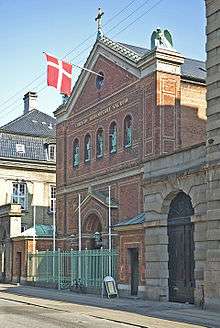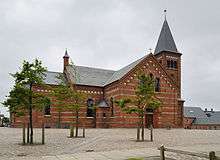Religion in Denmark

Of all the religions in Denmark, the most prominent is Christianity in the form of the Evangelical Lutheran Church of Denmark (Dansk Folkekirke), the state religion. Hence, Denmark is a non-secular state as there is a clear link between the church and the state with a Minister for Ecclesiastical Affairs. However, pockets of virtually all faiths can be found among the population. The second largest faith is Islam, due to immigration since 1980. In general, however, Danes feel themselves as secular, and church attendance is generally low.[1]
Religiosity
According to a Eurobarometer Poll conducted in 2010,[2] 28% of Danish citizens responded that "they believe there is a God", 47% responded that "they believe there is some sort of spirit or life force" and 24% responded that "they do not believe there is any sort of spirit, God or life force". Another poll, carried out in 2008, found that 25% of Danes believe Jesus is the son of God, and 18% believe he is the saviour of the world.[3] A gallup report in 2009 found that only 19% of Danes consider religion to be an important part of their life.[4]
Less than 20% of the Danish population identifies as atheist.[5] It is speculated that this is because religion is such a non-issue that not believing in it does not require a specific label. Phil Zuckerman, an American professor of sociology, after spending 14 months in Sweden and Denmark talking to hundreds of people about religion, reported that they were “often disinclined or hesitant to talk with [prof. Zuckerman] about religion, and even once they agreed to do so, they usually had very little to say on the matter.”[6]
Many people define themselves as spiritual but not religious. [7][8]
Religious communities

Christianity
| year | population | members | percentage |
|---|---|---|---|
| 1984 | 5,113,500 | 4,684,060 | 91.6% |
| 1990 | 5,135,409 | 4,584,450 | 89.3% |
| 2000 | 5,330,500 | 4,536,422 | 85.1% |
| 2005 | 5,413,600 | 4,498,703 | 83.3% |
| 2010 | 5,534,738 | 4,479,214 | 80.9% |
| 2015 | 5,659,715 | 4,400,754 | 77.8% |
| 2016 | 5,707,251 | 4,387,571 | 76.9% |
| Statistical data: 1984,[9] 1990-2016,[10] Source: Kirkeministeriet | |||
Christianity is the predominant religion of Denmark, with three quarters of the Danish population estimated as adherents of the "Folkekirken" ("People's Church"), Denmark's national Lutheran church.[11] Aside from Lutheranism, there is a small Roman Catholic minority, as well as small Protestant denominations such as the Baptist Union of Denmark and the Reformed Synod of Denmark.
According to official statistics from January 2016, 76.9%[12][13] of the population of Denmark are members of the Evangelical Lutheran Church of Denmark (Den danske folkekirke), the country's state church since the Reformation in Denmark–Norway and Holstein, and designated "the Danish people's church" by the 1848 Constitution of Denmark.[14]
A 2015 study estimates some 4,000 Christian believers from a Muslim background in the country, most of them belonging to some form of Protestantism.[15]
Judaism
A Jewish community has been present in Denmark since the seventeenth century, when the monarchs began allowing Jews to enter the country and practice their religion on an individual basis. Emancipation followed gradually and by the end of the nineteenth century most Jews were fully assimilated into Danish society. In the early decades of the twentieth century there was an influx of more secular, Yiddish speaking, Eastern European Jews. Nearly 99% of Danish Jews survived the Holocaust, in part due to the actions of the Danish resistance, and to the Swedish authorities' offer of asylum to the Danish Jews.[16]
Today there are approximately 10,000 ethnic Jews in Denmark, and three synagogues located in Copenhagen.
Islam

Denmark's Muslims make up approximately 3% of the population and form the country's second largest religious community and largest minority religion.[1][18] As of 2009 there are nineteen recognised Muslim communities in Denmark.[18][19] Ahmadi Muslims constructed the first mosque in the capital, Copenhagen. There were approximately 600 Ahmadis all over Denmark in 2006.[20]
Other groups

According to a survey of various religions and denominations undertaken by the Danish Foreign Ministry, other religious groups comprise less than 1% of the population individually and approximately 2% when taken all together.[21]
Baha'i Faith
The Baha'i Faith arrived in Denmark in 1925, but it did not make much impact until the arrival of American pioneers in 1946. A National Spiritual Assembly was formed in 1962. In 2005, it was estimated that there were about 1,251 Baha'is in the country.[22]
Buddhism
Buddhism in Denmark was brought back from expeditions that explored the Indian subcontinent. Initial interest was mainly from intellectuals, authors, Buddhologists and Philologists. In 1921, Christian F. Melbye founded the first Buddhist Society in Denmark, but it was later dissolved in 1950 before his death in 1953.[23][24] In the 1950s, there was a revival in interest towards Buddhism, especially Tibetan Buddhism and Hannah and Ole Nydahl, founded the first Karma Kagyu Buddhist centers in Copenhagen.[23][24] The third wave of Buddhism came in the 1980s, when refugees from Vietnam, Sri Lanka and China came to Denmark.
In 2009 Aarhus University estimated that there were 20,000 practising Buddhists in Denmark.[25][26]
Neopaganism
A neopagan religious group, Forn Siðr — Ásatrú and Vanatrú Association in Denmark, describes itself as a revival of the Norse paganism prevalent in Denmark before Christianization. It gained state recognition in November 2003.[27] Also, there are about 500 registered heathens (0.01% of the population) adhering to the old Norse beliefs.
Politics and government
Politicians in Denmark will not generally be found making use of any religious rhetoric or arguments in their declarations, and this is especially the case for government ministers, with the possible exception (sometimes) of the Minister for Ecclesiastical Affairs in the course of his or her duties. Four of Denmark's prime ministers have identified themselves as atheists.[28]
The Christian Democrats is the only major political party to regularly employ religious rhetoric and arguments, and they have not been represented in the Folketing since 2001, as they have not been able to acquire the minimum 2% of the votes needed to secure a seat.
Danish Constitution
| Wikisource has original text related to this article: |
The Constitution of Denmark contains a number of sections related to religion.
- §4 establishes the Evangelical Lutheran Church of Denmark as the state church of Denmark.
- §6 requires the Danish monarch to be a member of the state church.
- §67 grants freedom of worship.
- §68 states that no one is required to personally contribute to any form of religion other than his own. As state subsidies are not considered personal contributions[29] the Church of Denmark receives subsidies - according to §4 - beyond the church tax paid by the members of the church. The Church of Denmark is the only religious group to receive direct financial support from the state. Other religious groups can receive indirect support through tax deductions on contributions.[30]
- §70 grants freedom of religion by ensuring civil and political rights can not be revoked due to race or religious beliefs. It further states race and religious beliefs can not be used to be exempt from civil duties.
- §71 ensures no one can be imprisoned due to religious beliefs.
See also
- Christianization of Scandinavia
- Buddhism in Denmark
- Bahá'í Faith in Denmark
- Islam in Denmark
- History of the Jews in Denmark
- Hinduism in Denmark
References
- 1 2 "Denmark – Bureau of Democracy, Human Rights, and Labor". International Religious Freedom Report 2009. U.S. Department of State. 2009. Retrieved 23 August 2012.
- ↑ "Special Eurobarometer, biotechnology" (PDF). TNS Opinion & Social on request of European Commission. European Commission. October 2010. p. 204. Retrieved 26 October 2015.
- ↑ Johansen, Tobias Stern (23 December 2009). "Hver fjerde dansker tror på Jesus" [One in four Danes believes in Jesus] (in Danish). Kristeligt Dagblad. Archived from the original on 20 January 2013: The poll was carried out in December 2009 using a cross-section of 1114 Danes between the ages 18 and 74.
- ↑ Crabtree, Steve. "Religiosity Highest in World's Poorest Nations". Gallup. Retrieved 27 May 2015.
- ↑ "Næsten hver femte dansker kalder sig ateist". Berlingske Tidende. 7 October 2013. Retrieved 2016-11-19.
- ↑ Steinfels, Peter (27 Feb 2009). "Scandinavian Nonbelievers, Which Is Not to Say Atheist". New York Times. Retrieved 2016-11-19.
- ↑ Atheism and Secularity - Google Books. Books.google.co.uk. 2009-12-21. Retrieved 2013-08-16.
- ↑ "Beliefs about God across Time and Countries" (PDF). Norc.org. Retrieved 2013-08-16.
- ↑ Church membership 1984 Danmarks statistik (Danish)
- ↑ "Medlemmer af folkekirken" [Members of the church]. Danish Ministry for Gender Equality and Ecclesiastical Affairs (in Danish). 1 January 2013. Archived from the original on 1 November 2013.
- ↑ (Danish) Official Church of Denmark statistics
- ↑ Fler lämnade kyrkan i Danmark 3.1.2015 Kyrkans tidning
- ↑ Statistics Denmark Statistikbanken.dk
- ↑ § 4, "the Evangelical-Lutheran Church is the Danish people's church and is supported as such by the State" ("den evangelisk-lutherske kirke er den danske folkekirke og understøttes som sådan af staten")
- ↑ Johnstone, Patrick; Miller, Duane (2015). "Believers in Christ from a Muslim Background: A Global Census". IJRR. 11: 14. Retrieved 20 November 2015.
- ↑ "Rescue in Denmark." U.S. Holocaust Museum https://www.ushmm.org/outreach/en/article.php?ModuleId=10007740
- ↑ Ahmadiyya Muslim Mosques Around the World, pg. 184
- 1 2 Denmark country profile- [Euro-Islam.info] and Muslimpopulation.com – Retrieved 8 June 2012.
- ↑ Facts about Islam in Denmark – Ministry of Foreign Affairs of Denmark. Published/Last edited 10 May 2009. Retrieved 24 March 2012. www.ambdhaka.um.dk
- ↑ Rytter, Mikkel (2013). Family Upheaval: Generation, Mobility and Relatedness among Pakistani Migrants in Denmark. Berghahn Books. p. 14. ISBN 978-0-85745-940-4. Retrieved 2 December 2016.
- ↑ "Denmark - Official Denmark - Church and Religion". Ministry of Foreign Affairs (Denmark). Archived from the original on 8 February 2006.
- ↑ Most Baha'i Nations (2005)
- 1 2 "Article on Avisen.dk (''in Danish'')". Avisen.dk. Retrieved 2009-08-03.
- 1 2 "DR (Danish state news-agency), article about the History of Buddhism (''In Danish'')". Dr.dk. 10 August 2006. Retrieved 2009-08-03.
- ↑ "Danske børn vil være buddhister". Avisen.dk. Retrieved 2013-03-26.
- ↑ Journal of Global Buddhism, Article by Jørn Borup, Department of Study of Religion at University of Aarhus, Denmark. 2008, based on research from 2005
- ↑ Sørensen, Torben (19 April 2007). "Forn Siðr – the Asa and Vane faith religious community in Denmark – Forn Siðr". Fornsidr.dk. Archived from the original on 27 March 2009. Retrieved 24 August 2012.
- ↑ List of atheists in politics and law#Denmark
- ↑ Grundloven på let dansk, Folketinget, 2001
- ↑ "Statstilskud: Statstilskud og grundloven" [Government subsidies: Government subsidies and the Constitution] (in Danish). Ministry of Ecclesiastical Affairs. Retrieved 1 December 2016.

